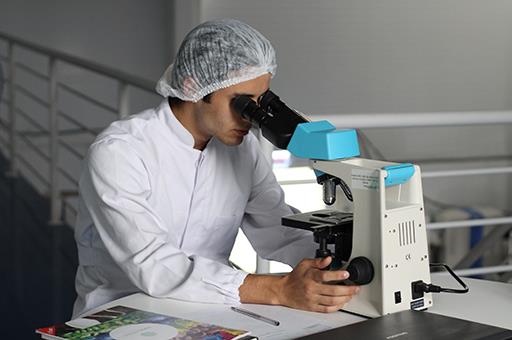Coronavirus COVID-19
Carlos III Health Institute to coordinate European virological studies on COVID-19
News - 2020.3.30
The Carlos III Institute of Health (Spanish acronym: ISCIII) is leading the coordination of virological studies on COVID-19 within the European multi-disciplinary network to research, prevent and control this disease via the I-MOVE-COVID-19 project (Multidisciplinary European Network for Research, Prevention and Control of the COVID-19 Pandemic). This is one of the European projects included under the express call for applications from the EU Programme for Research and Innovation - Horizon 2020 announced by the European Commission to research various aspects of the SARS-CoV-2 virus.
Coordinated by the French EPICONCEPT programme, the National Microbiology (CNM) and Epidemiology (CNE) Centres of the ISCIII will take part in I-MOVE-COVID-19 as partners, alongside the Public and Occupational Health Institute of Navarre. The ISCIII, which will receive a total of 210,000 euros, will sit on the Managing Scientific Committee and the Executive Board of I-MOVE and will help to build a multi-disciplinary European network for research, prevention and control of COVID-19. Inmaculada Casas and Francisco Pozo, from the CNM, and Amparo Larrauri, from the CNE, are the lead researchers from the ISCIII on the project.
I-MOVE has been divided into four work packages. The first (WP1) deals with management, scientific coordination and communication. The second (WP2) deals with the primary healthcare surveillance networks. The third (WP3) deals with the hospital networks, and the fourth (WP4) deals with the joint virological and epidemiological studies. The ISCIII will take part in work packages WP2, WP3 and WP4 to coordinate the virological objectives set and provide data from the national primary healthcare surveillance system and information from two hospitals.
Schedule, experts and objectives
The project has been divided into three stages. The first, which will last for one or two months, will update all the tools, protocols and developments from the four work packages. The duration of the second stage will depend on the epidemiological situation, and will activate and develop the primary and hospital healthcare surveillance systems and begin the clinical, virological and epidemiological studies based on the information obtained. The third stage will analyse the sustainability of the project and need for additional funding, assess the work of the surveillance systems and trials, and review the protocols produced and developed for application to future epidemics. The information obtained throughout the project will be shared with the international community for tackling COVID-19 together.
I-MOVE-COVID-19 works with information obtained from patients in all participating countries with confirmed and suspected cases in both primary healthcare and hospitals, specifically people with symptoms compatible with COVID-19 and respiratory problems. It is made up by clinicians, virologists, epidemiologists, mathematicians and immunologists, among others, who have been working on the front line against the pandemic and who have prior experience in the research, handling and surveillance of other contagious diseases and epidemics.
The CNM and CNE, benchmark centres
The National Microbiology Centre will lead the coordination of virological results and those tasks related to the analysis of the viruses in work packages 2, 3 and 4. It will also coordinate the isolation and sequencing of the viruses extracted from positive cases, both minor and serious, a task that is expected to last one year.
The ISCIII was chosen for the project thanks to the work and capacity of its National Microbiology and Epidemiology Centres. The project highlights the value of scientific services from the CNM in the fields of bioinformatics, genome sequencing, proteomic analysis, electronic microscopy, cytometry, transgenesis and cryopreservation, among others, as well as its level 3 biosafety laboratory and various benchmark laboratories for the National Health System.
In terms of the CNE, it highlights its work on the national epidemiological coordination of contagious diseases, such as the flu, with the RENAVE National Surveillance Network; its experience of working with European and international bodies such as the ECDC and the WHO; its ability to manage and interpret data from various information and surveillance systems; and its work on the predictive and evolutionary analysis of infectious diseases.
The objectives for I-MOVE-COVID-19 include the following:
- To improve knowledge of how the virus behaves.
- To define behaviour patterns for the disease.
- To gather more precise data on incidence, risk factors and mortality rates by age and risk group.
- To identify community transmission patterns.
- To sequence the complete genome of the virus in different geographic regions and time periods of the pandemic to assess phytogenetic evolution and transmission pathways.
- To describe the incubation period in minor and serious cases.
- To measure the effectiveness of prevention measures and therapeutic alternatives.
- To describe the viral genotype based on geographic location and its spread over time.
- To promote and improve diagnostic testing.
- To measure the effectiveness of possible vaccines.
- To analyse resistance to possible antiviral treatments.
- To research cases and their characteristics in healthcare professionals.
- To gather evidence for preventive decision-making and early intervention.
- To build infrastructure capable of the fast detection of similar epidemics.
Non official translation





